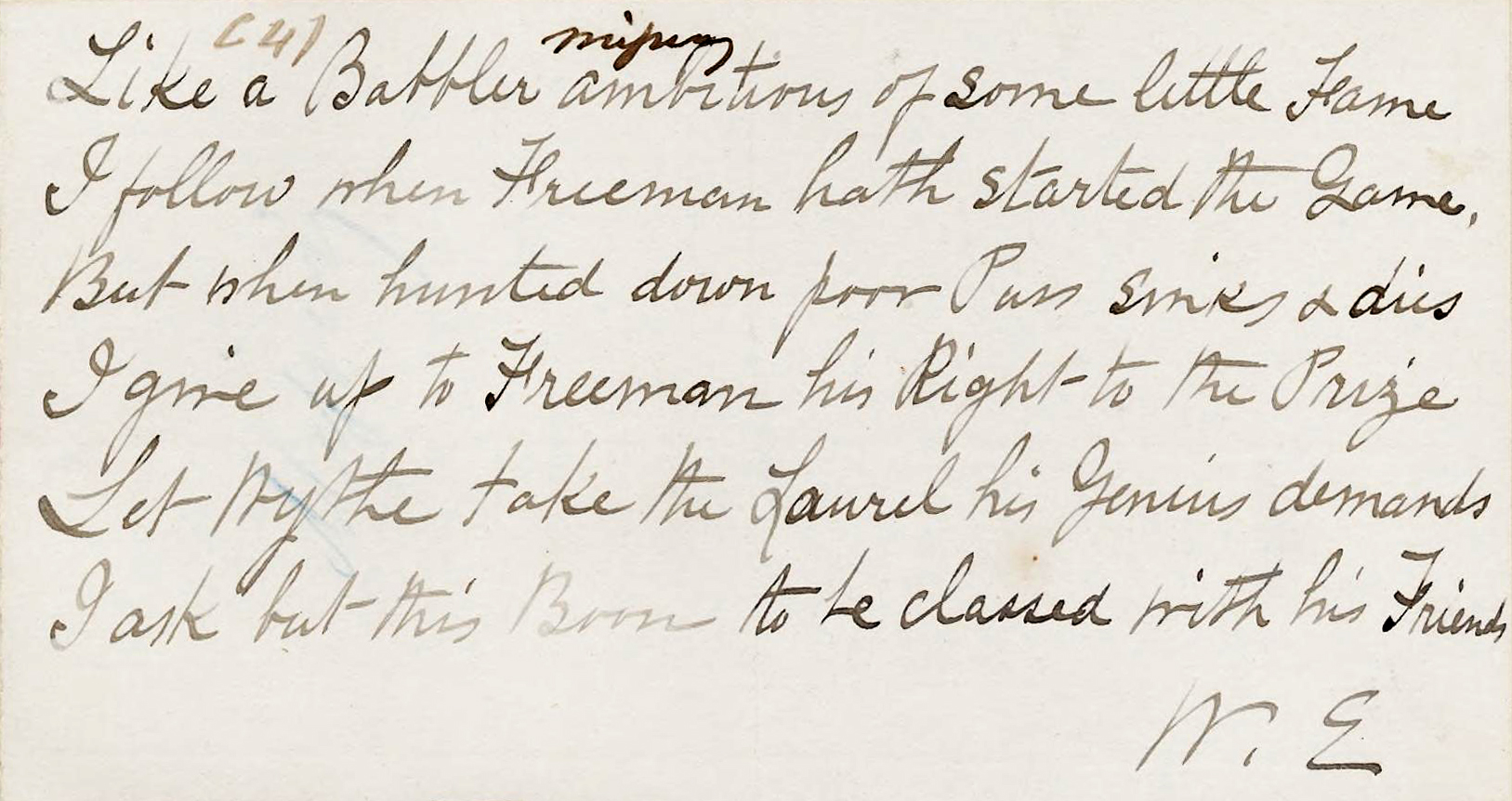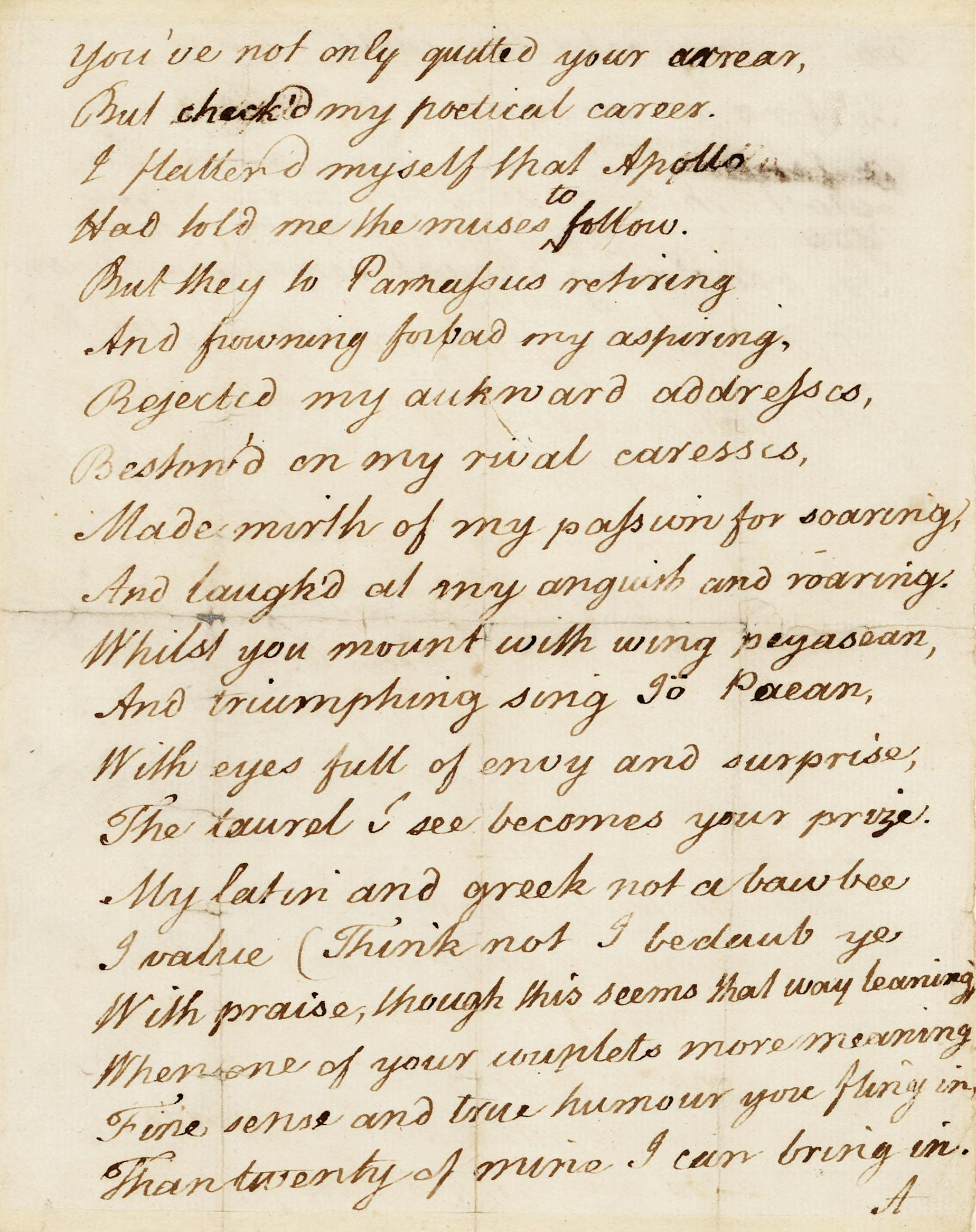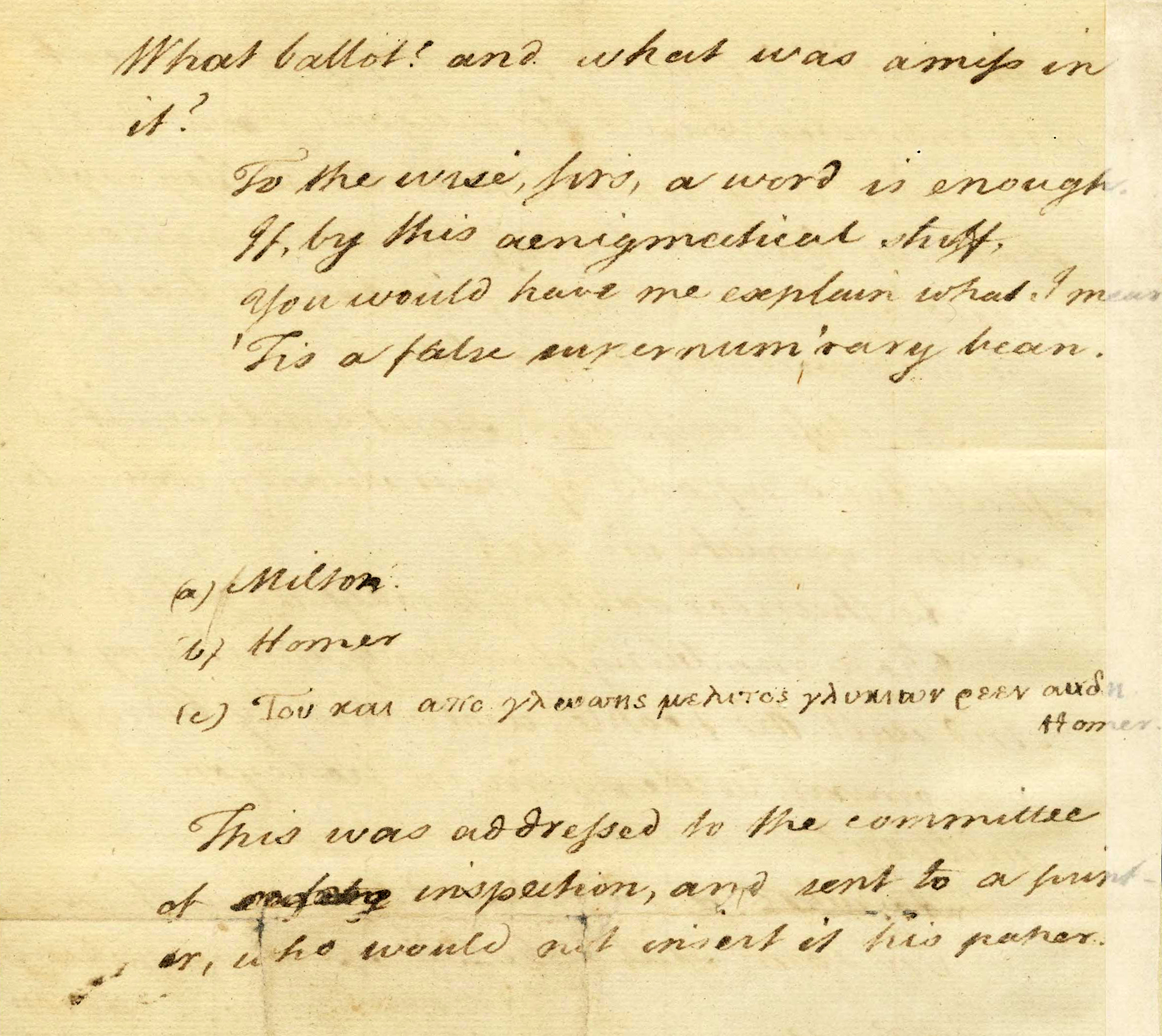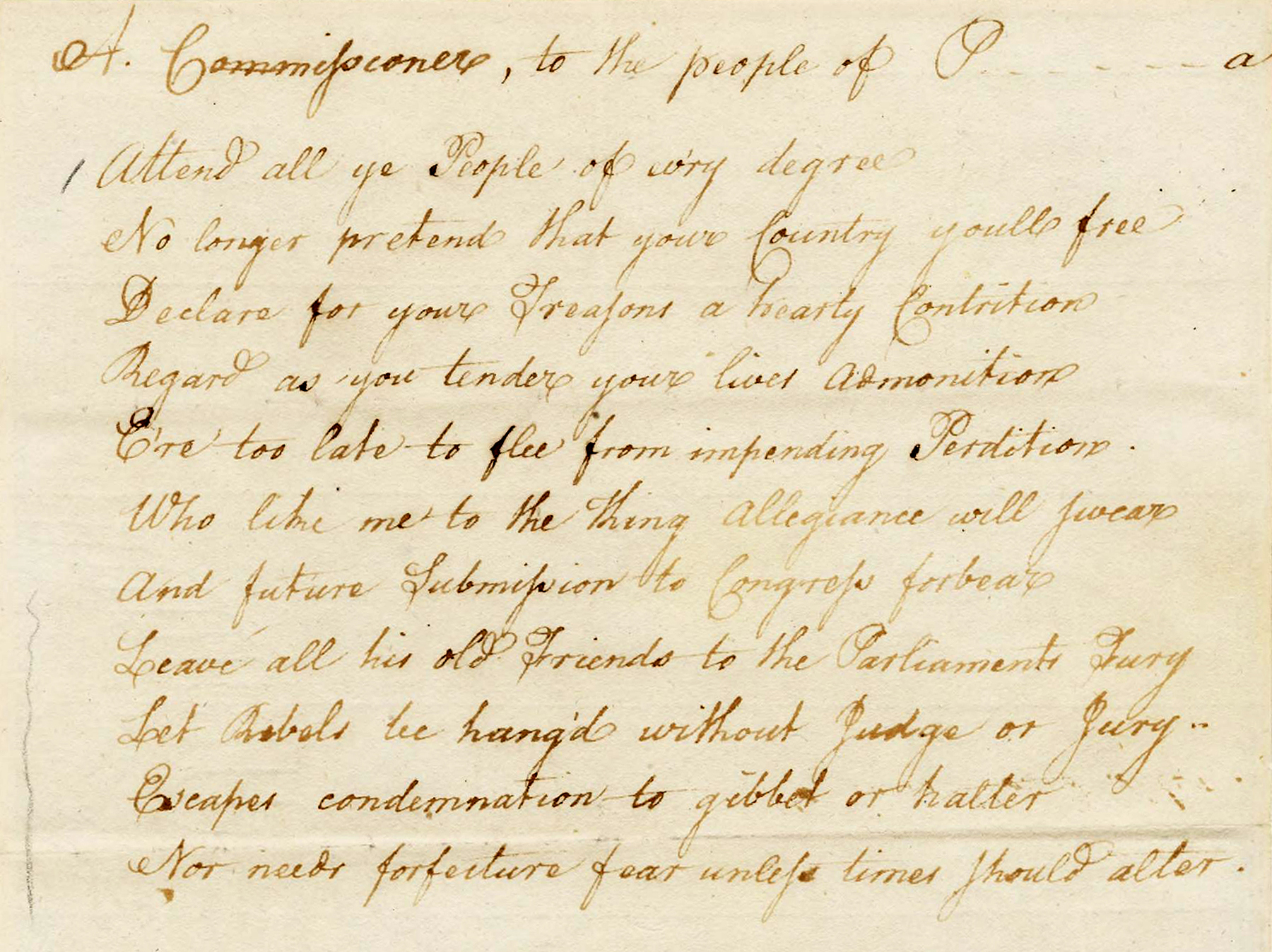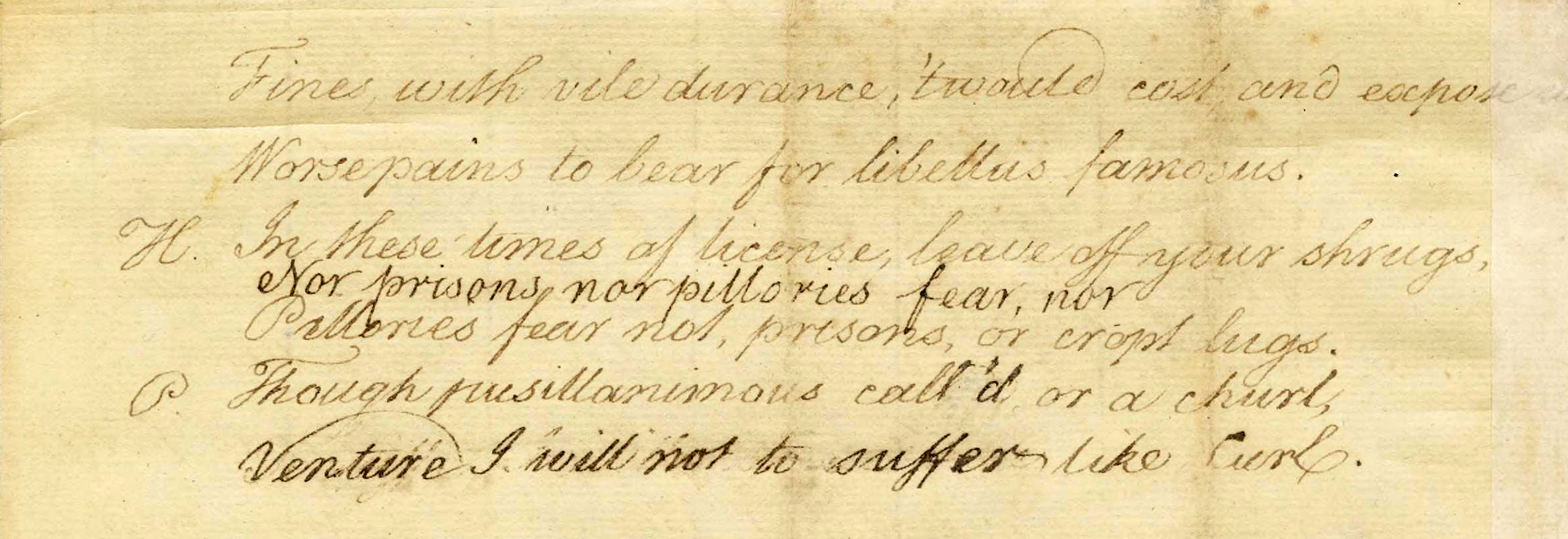Difference between revisions of "Poems on Witty Subjects in Congress"
(→"A Commissioner, to the People of Philadelphia," by William Ellery) |
|||
| Line 1: | Line 1: | ||
[[File:PoemsOnWittySubjectsInCongressP6.jpg|thumb|250px|[[George Wythe]] (VA) and William Ellery (RI) exchanged verses on pieces of scrap paper during [[wikipedia:Second Continental Congress|Congress]], as evidenced by this page, which was addressed to "The Hon. William Ellery, Delegate for the State of Rhode Island, in Continental Congress, Philadelphia."]] | [[File:PoemsOnWittySubjectsInCongressP6.jpg|thumb|250px|[[George Wythe]] (VA) and William Ellery (RI) exchanged verses on pieces of scrap paper during [[wikipedia:Second Continental Congress|Congress]], as evidenced by this page, which was addressed to "The Hon. William Ellery, Delegate for the State of Rhode Island, in Continental Congress, Philadelphia."]] | ||
| − | George Wythe returned to the Second Continental Congress in Philadelphia sometime in mid-September, 1776.<ref>The exact date of Wythe's arrival in Philadelphia is not known. Wythe's signature does not appear on a letter from the Virginia delegates to the Pennsylvania delegates dated September 12, 1776, regarding a temporary border between the two commonwealths (Peter Force, ''American Archives,'' 5th ser. (Washington, D.C.: M. St. Clair and Peter Force, 1851) 2:42; but [wikipedia:Josiah Bartlett|]], in a letter to [[wikipedia:William Whipple|]] dated September 14, reports "Mr. Wythe is come to Congress." Edmund C. Burnett, ed. ''Letters of Members of the Continental Congress,'' vol. 2, ''July 5, 1776 to December 31, 1777'' (Washington, D.C.: Carnegie Institution of Washington, 1921), 89.</ref> By November, Congress was facing a split caused by the northern states offering additional pay to their soldiers, which the southern states could neither match nor afford.<ref>W. Edwin Hemphill, "[[Media:HemphillGeorgeWytheCourtsTheMusesJuly1952.pdf|George Wythe Courts the Muses]]," ''William and Mary Quarterly'' 3rd ser., 9, no. 3 (July 1952), 340.</ref> [[George Wythe]], delegate from Virginia, addressed a short, humorous poem to [[wikipedia:William Ellery|William Ellery]] of Rhode Island, suggesting that the "Yankees" generosity would ruin Congress's efforts. Ellery responded in kind, and the two exchanged verses until Wythe left Congress to return to the Virginia Convention, in December. | + | George Wythe returned to the Second Continental Congress in Philadelphia sometime in mid-September, 1776.<ref>The exact date of Wythe's arrival in Philadelphia is not known. Wythe's signature does not appear on a letter from the Virginia delegates to the Pennsylvania delegates dated September 12, 1776, regarding a temporary border between the two commonwealths (Peter Force, ''American Archives,'' 5th ser. (Washington, D.C.: M. St. Clair and Peter Force, 1851) 2:42; but [[wikipedia:Josiah Bartlett|Josiah Bartlett]], in a letter to [[wikipedia:William Whipple|William Whipple]] dated September 14, reports "Mr. Wythe is come to Congress." Edmund C. Burnett, ed. ''Letters of Members of the Continental Congress,'' vol. 2, ''July 5, 1776 to December 31, 1777'' (Washington, D.C.: Carnegie Institution of Washington, 1921), 89.</ref> By November, Congress was facing a split caused by the northern states offering additional pay to their soldiers, which the southern states could neither match nor afford.<ref>W. Edwin Hemphill, "[[Media:HemphillGeorgeWytheCourtsTheMusesJuly1952.pdf|George Wythe Courts the Muses]]," ''William and Mary Quarterly'' 3rd ser., 9, no. 3 (July 1952), 340.</ref> [[George Wythe]], delegate from Virginia, addressed a short, humorous poem to [[wikipedia:William Ellery|William Ellery]] of Rhode Island, suggesting that the "Yankees" generosity would ruin Congress's efforts. Ellery responded in kind, and the two exchanged verses until Wythe left Congress to return to the Virginia Convention, in December. |
==Manuscript text, November-December 1776== | ==Manuscript text, November-December 1776== | ||
Revision as of 17:43, 9 February 2015
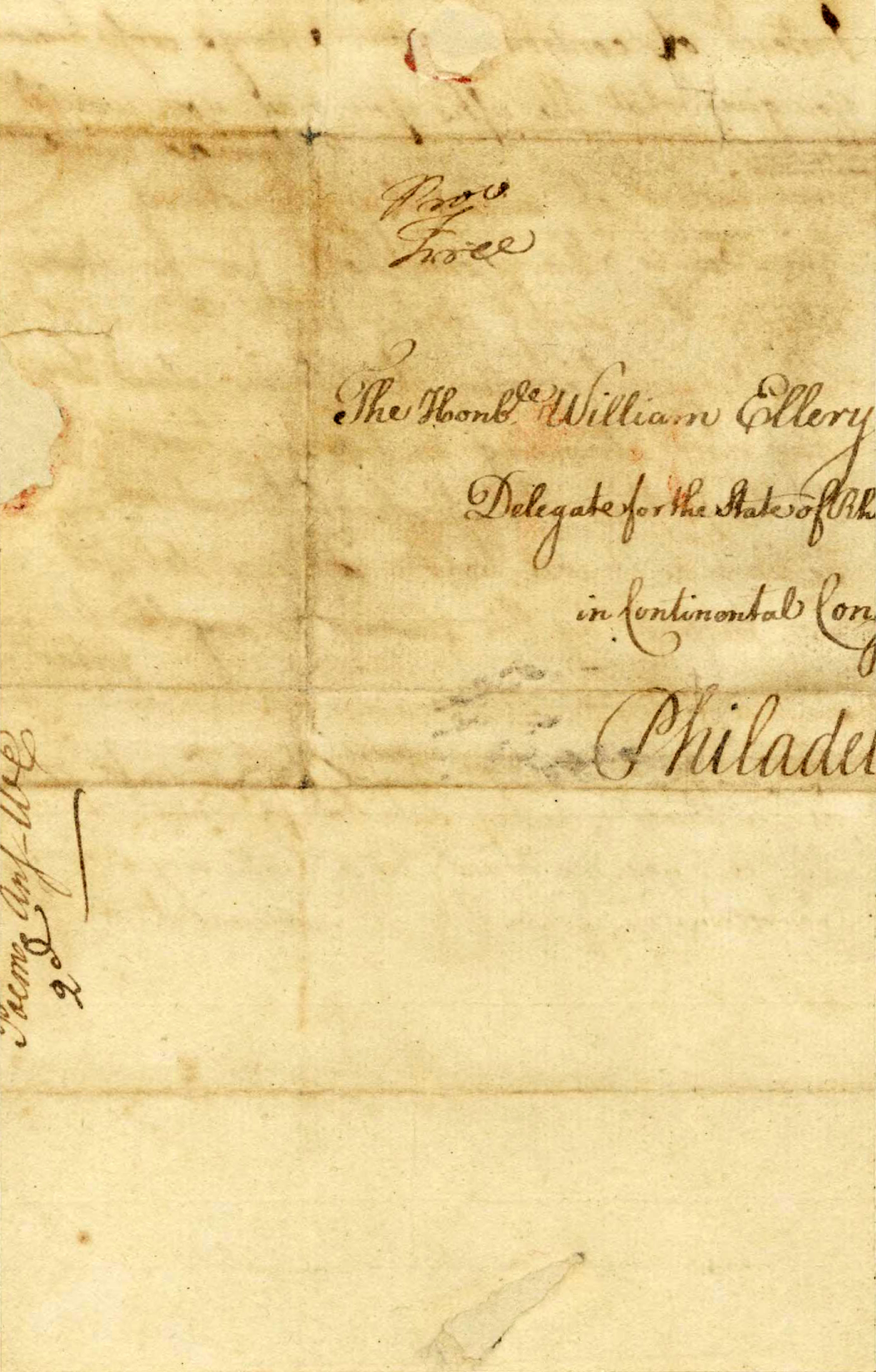
George Wythe returned to the Second Continental Congress in Philadelphia sometime in mid-September, 1776.[1] By November, Congress was facing a split caused by the northern states offering additional pay to their soldiers, which the southern states could neither match nor afford.[2] George Wythe, delegate from Virginia, addressed a short, humorous poem to William Ellery of Rhode Island, suggesting that the "Yankees" generosity would ruin Congress's efforts. Ellery responded in kind, and the two exchanged verses until Wythe left Congress to return to the Virginia Convention, in December.
Contents
- 1 Manuscript text, November-December 1776
- 1.1 "A Member of the Antinovanglian Faction to W. E.," by George Wythe (VA)
- 1.2 "A Novanglican to G.W.," by William Ellery (RI)
- 1.3 "Instead of Controlling Our Mary's Cross Humor," by William Ellery
- 1.4 "For Farms in Utopia, the Moon, or Some Fairyland," by George Wythe
- 1.5 Epigram, by William Ellery
- 1.6 "With One Epigram, Though Well Hit Off" by George Wythe
- 1.7 "Unless You Will Take One Line for Your Ten," by William Ellery
- 1.8 "You've Not Only Quitted Your Arrear," by George Wythe
- 1.9 "The Gen'rous Idea Your Last Piece Expresses," by William Ellery
- 1.10 Martial, Epigram XII.47, in Wythe's hand
- 1.11 "Those with Whom the Powers of Government Are Entrusted," by George Wythe
- 1.12 "A Commissioner, to the People of Philadelphia," by William Ellery
- 1.13 Copy of Ellery's "A Commissioner, to the People of Philadelphia," in Wythe's Hand, with dialogue
- 2 See also
- 3 Further reading
- 4 References
- 5 External links
Manuscript text, November-December 1776
"A Member of the Antinovanglian Faction to W. E.," by George Wythe (VA)
|
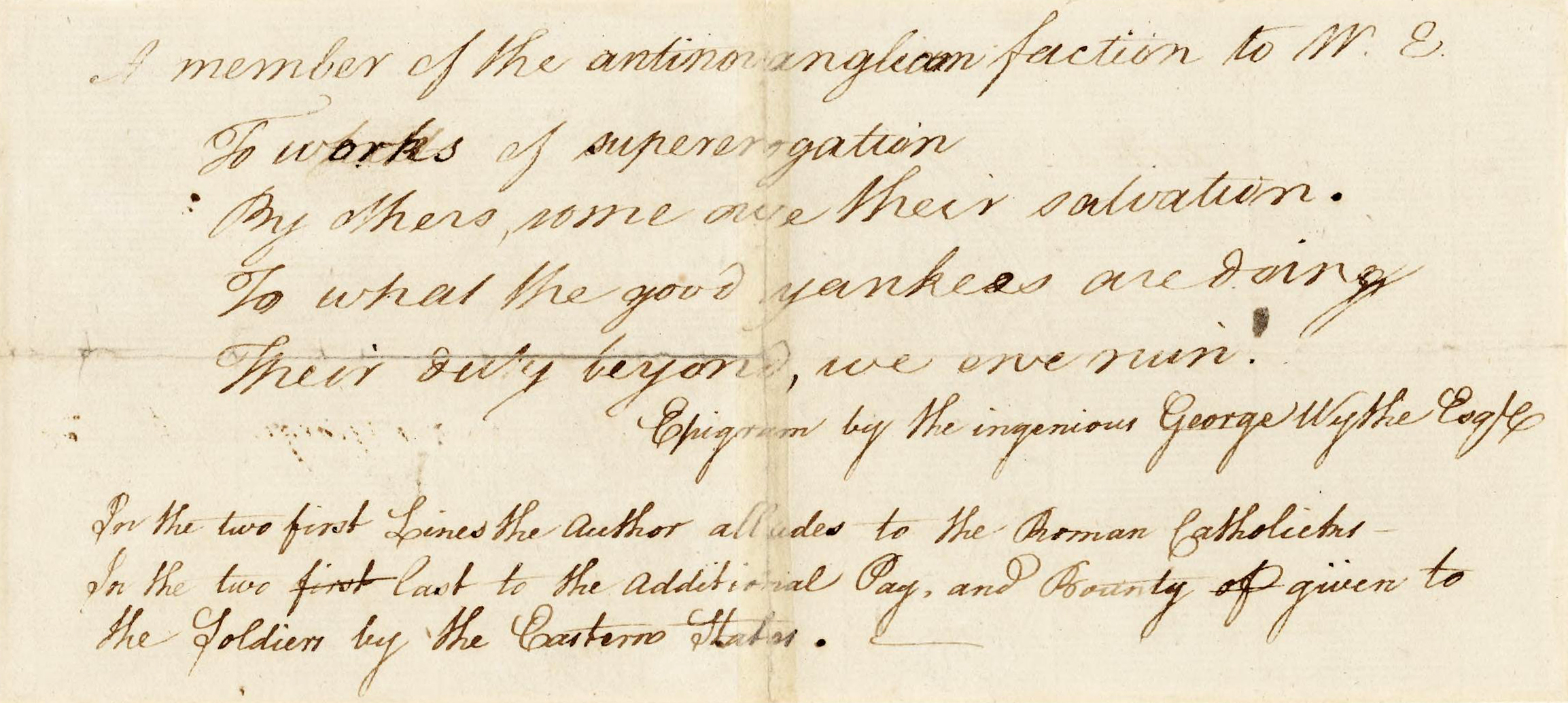 Manuscript endorsed on the reverse as "1st Poem", page seven of Poems on Witty Subjects in Congress, from the Boston Public Library's American Revolutionary War Manuscripts Collection. |
"A Novanglican to G.W.," by William Ellery (RI)
|
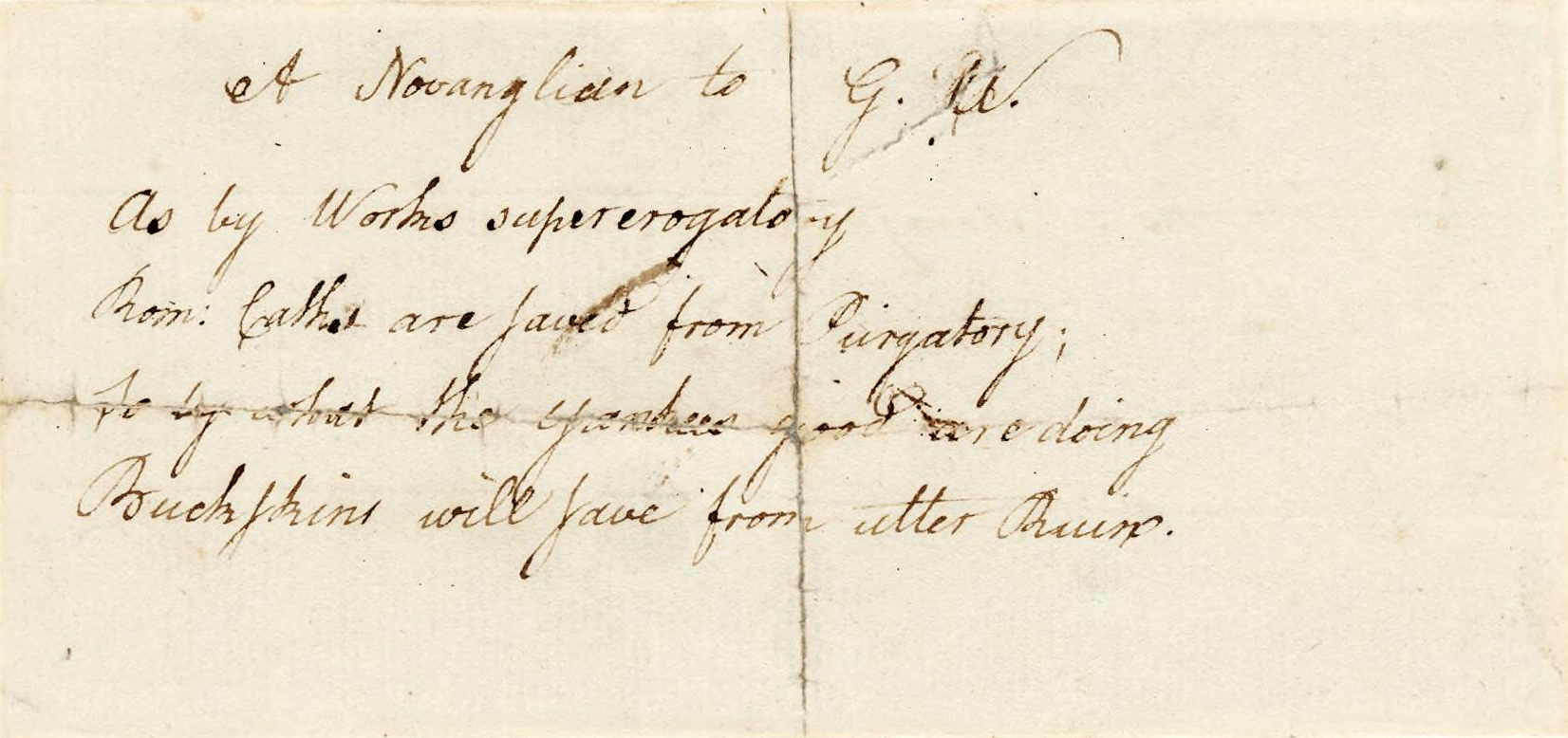 Endorsed on the reverse as "To G. Wythe / Answer to / 1.st Poem", page three of Poems on Witty Subjects in Congress, from the Boston Public Library's American Revolutionary War Manuscripts Collection. |
"Instead of Controlling Our Mary's Cross Humor," by William Ellery
|
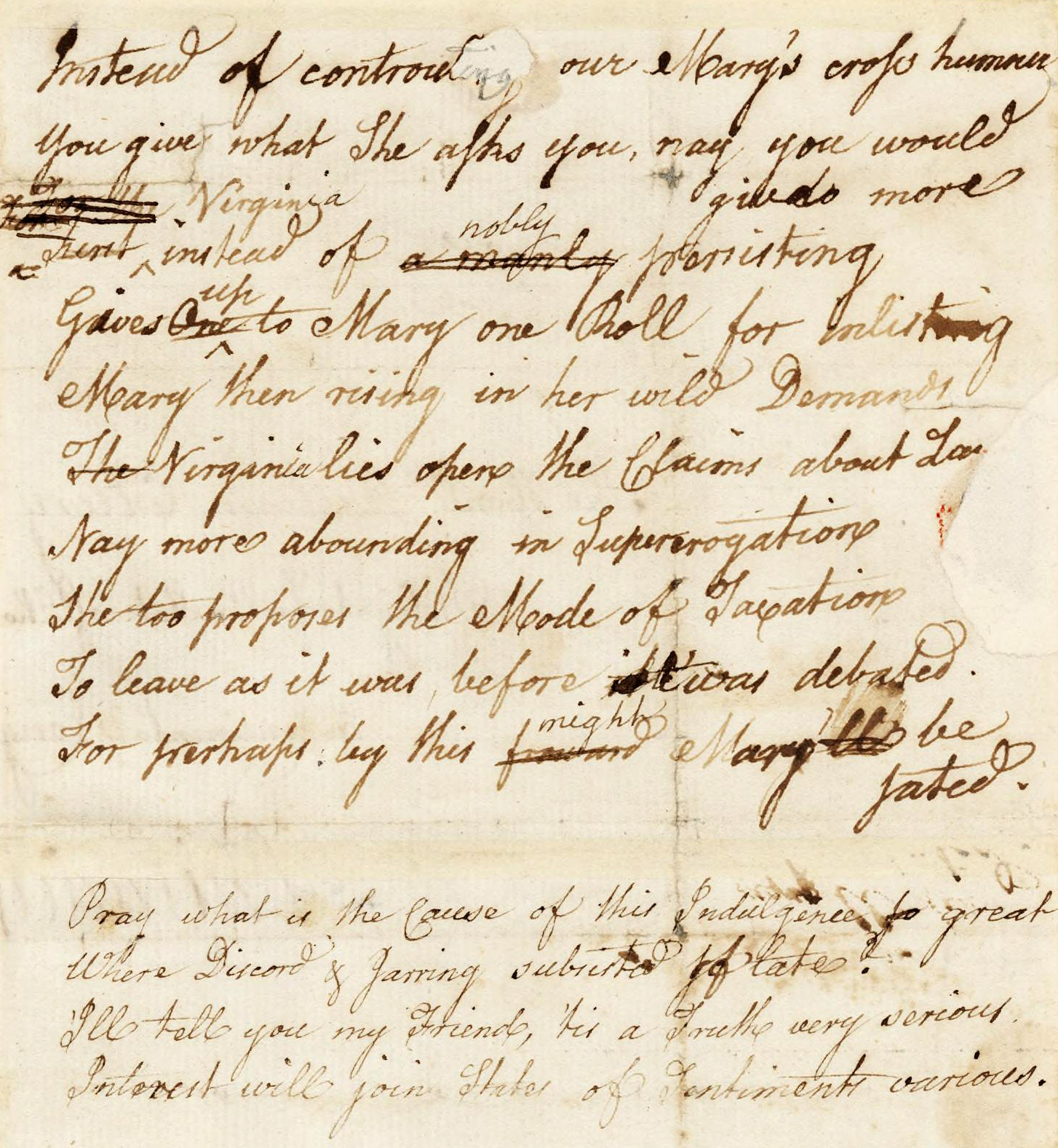 Manuscript endorses as "Poem Ans — WE / 2d", page five of Poems on Witty Subjects in Congress, from the Boston Public Library's American Revolutionary War Manuscripts Collection. |
"For Farms in Utopia, the Moon, or Some Fairyland," by George Wythe
|
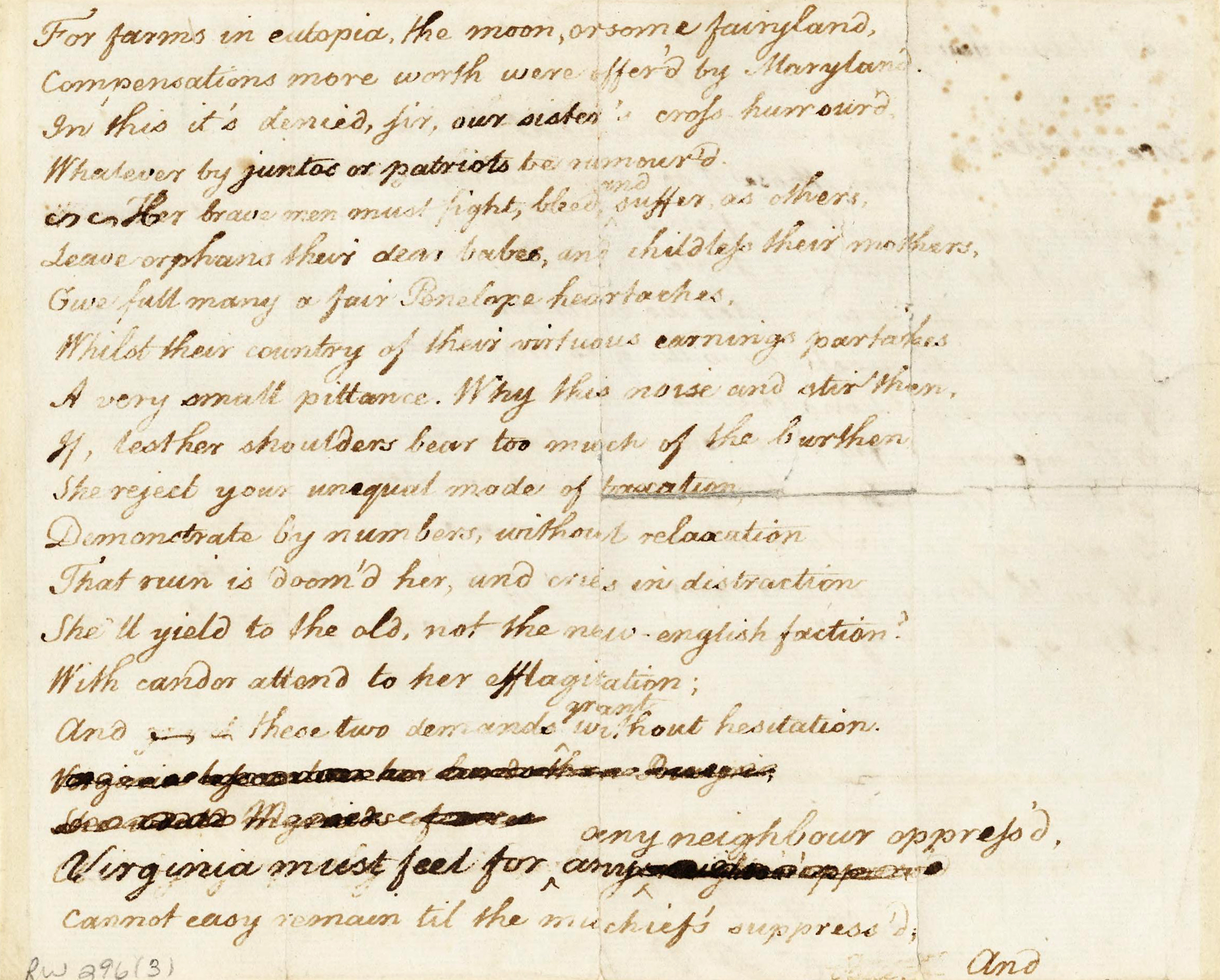 Page nine of Poems on Witty Subjects in Congress, from the Boston Public Library's American Revolutionary War Manuscripts Collection. | |
|
And if slaves you include in your capitation, |
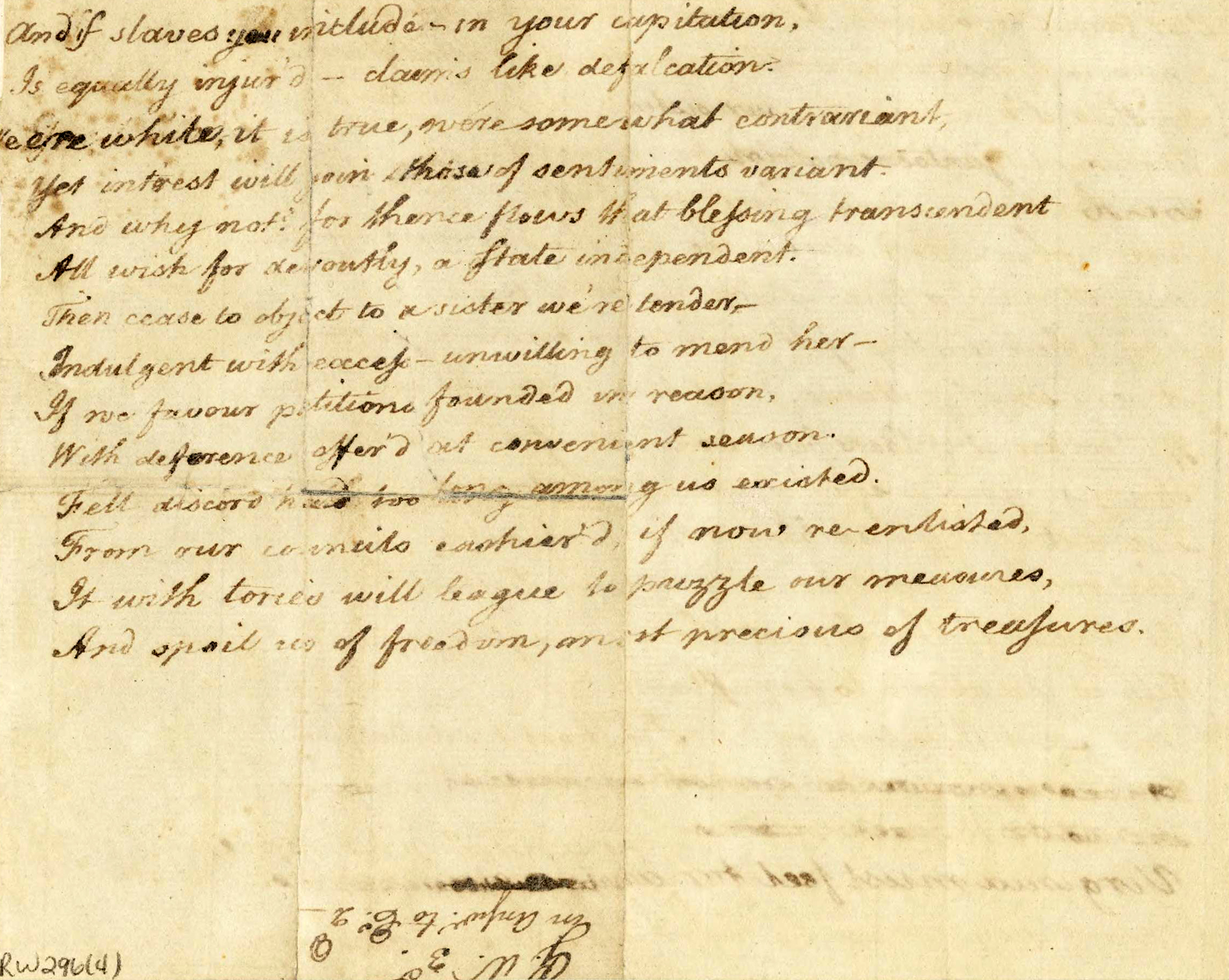 Manuscript endorsed as "G.W. 3d. / in Answr. to E.s 2d", page ten of Poems on Witty Subjects in Congress, from the Boston Public Library's American Revolutionary War Manuscripts Collection. |
Epigram, by William Ellery
|
"With One Epigram, Though Well Hit Off" by George Wythe
|
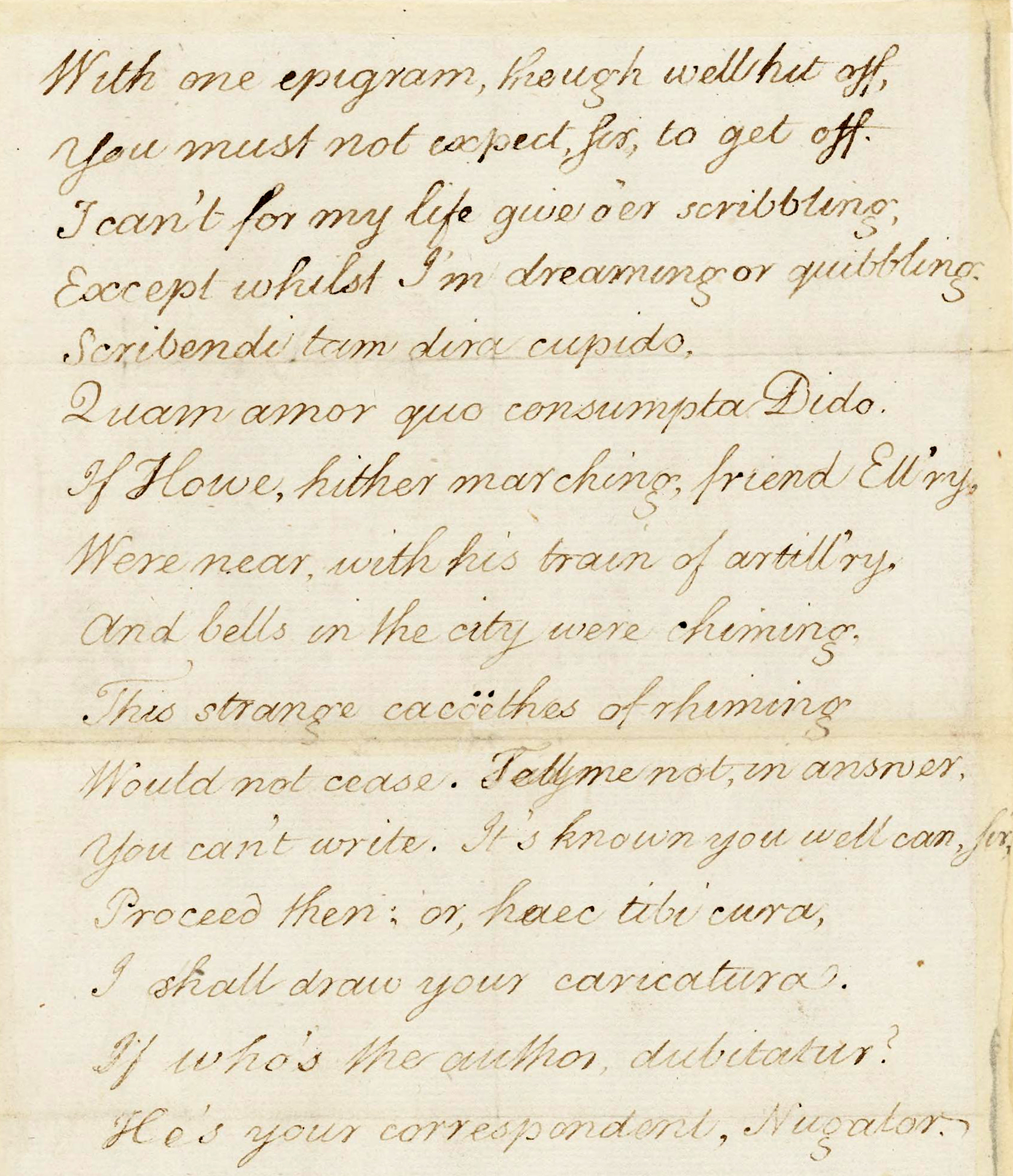 Manuscript endorsed |
"Unless You Will Take One Line for Your Ten," by William Ellery
|
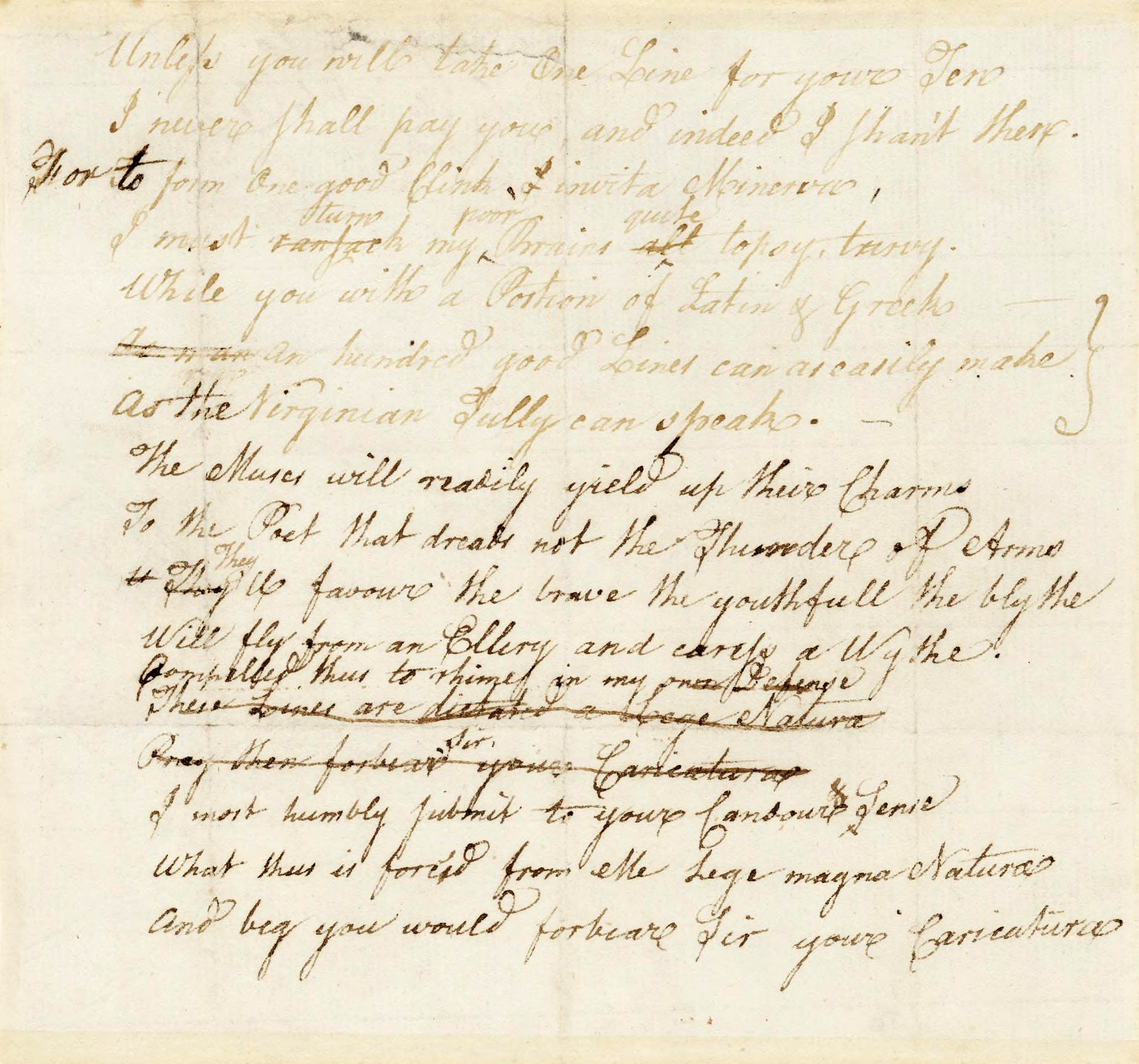 Manuscript endorsed "Answer E to / the Answr. to 4", page twenty-three of Poems on Witty Subjects in Congress, from the Boston Public Library's American Revolutionary War Manuscripts Collection. |
"You've Not Only Quitted Your Arrear," by George Wythe
|
|
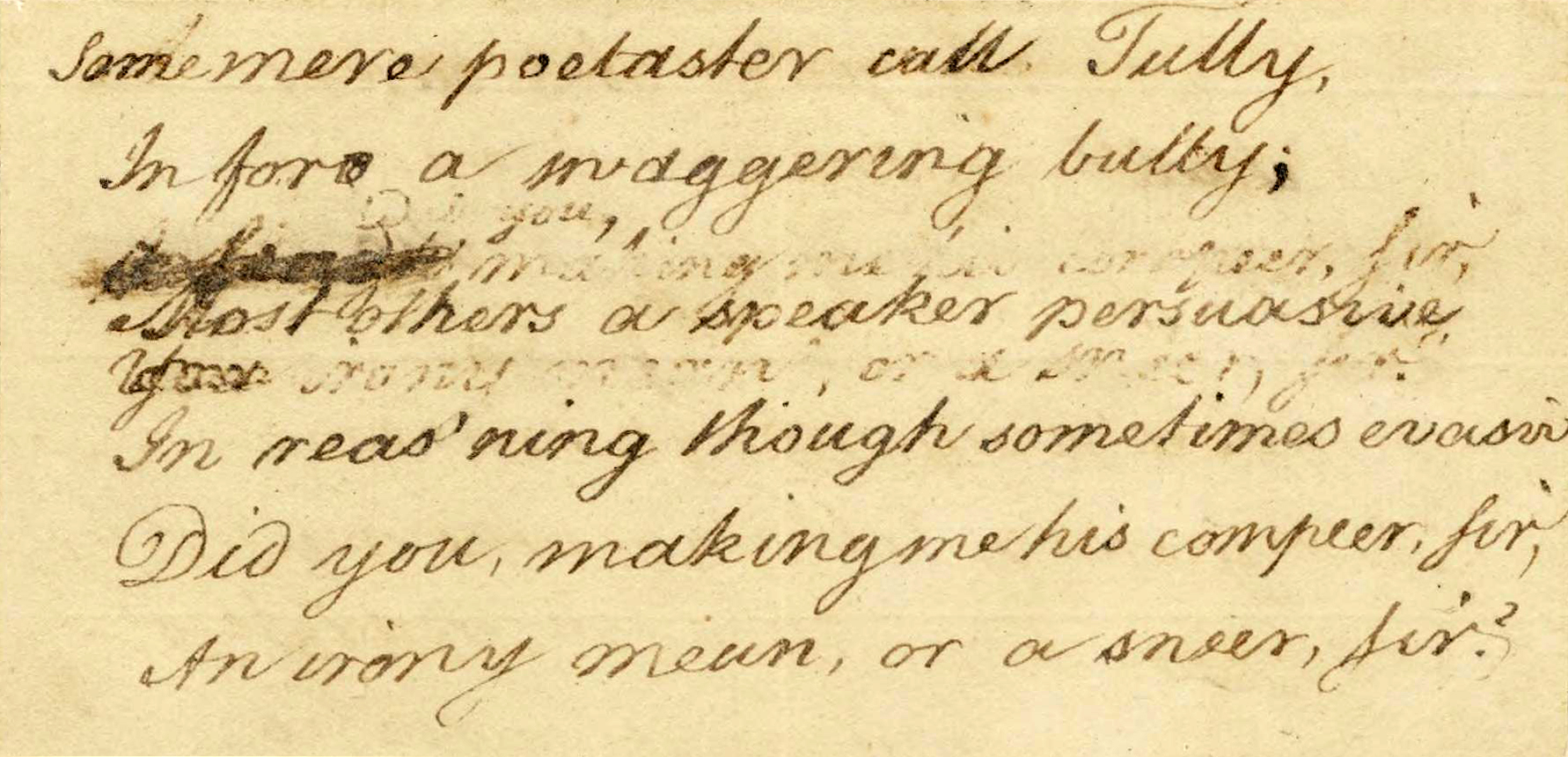 Manuscript endorsed "Poem W.5", page sixteen of Poems on Witty Subjects in Congress, from the Boston Public Library's American Revolutionary War Manuscripts Collection. |
"The Gen'rous Idea Your Last Piece Expresses," by William Ellery
|
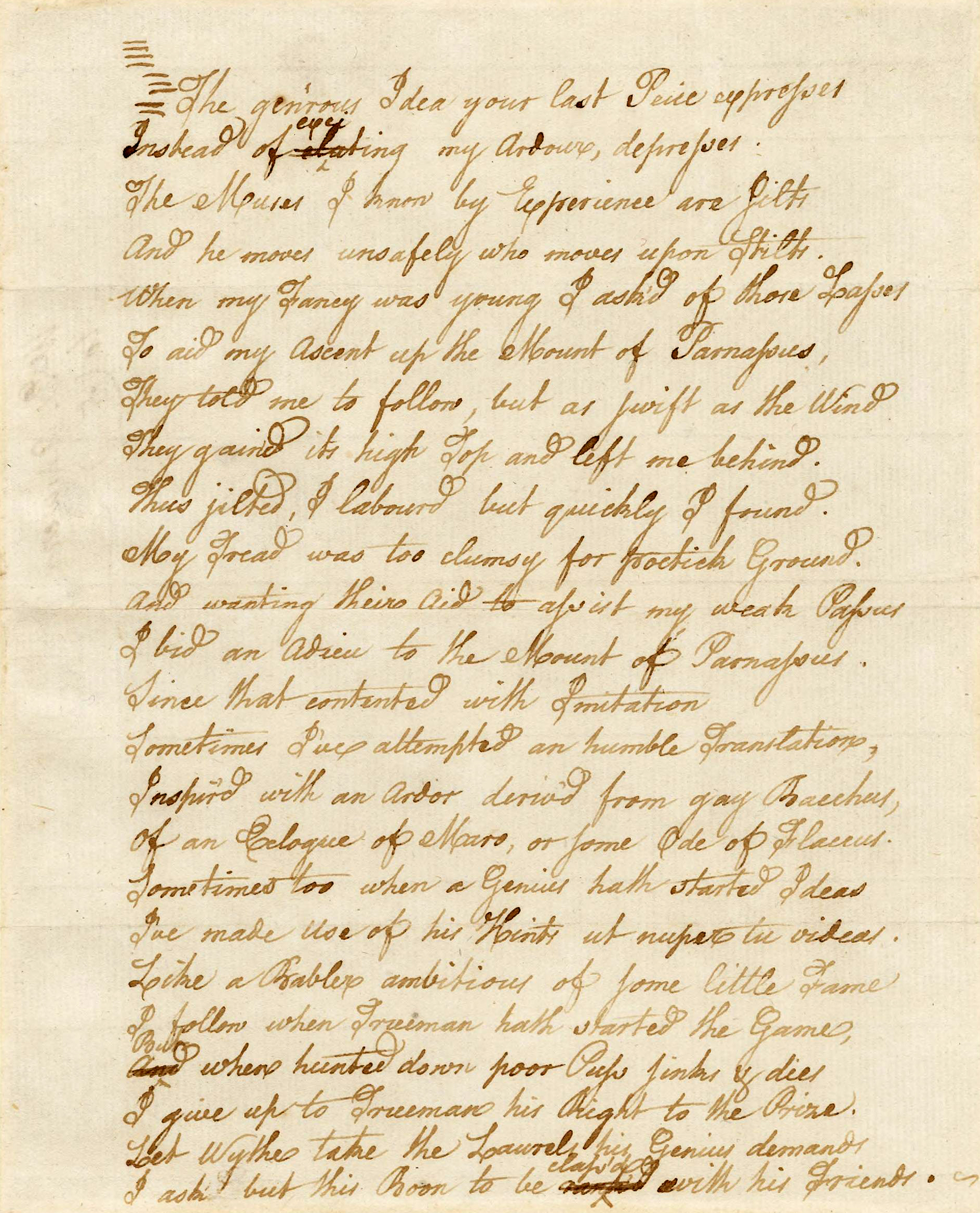 Manuscript endorsed "WE. Answer / to 5", page twenty-five of Poems on Witty Subjects in Congress, from the Boston Public Library's American Revolutionary War Manuscripts Collection. |
Martial, Epigram XII.47, in Wythe's hand
|
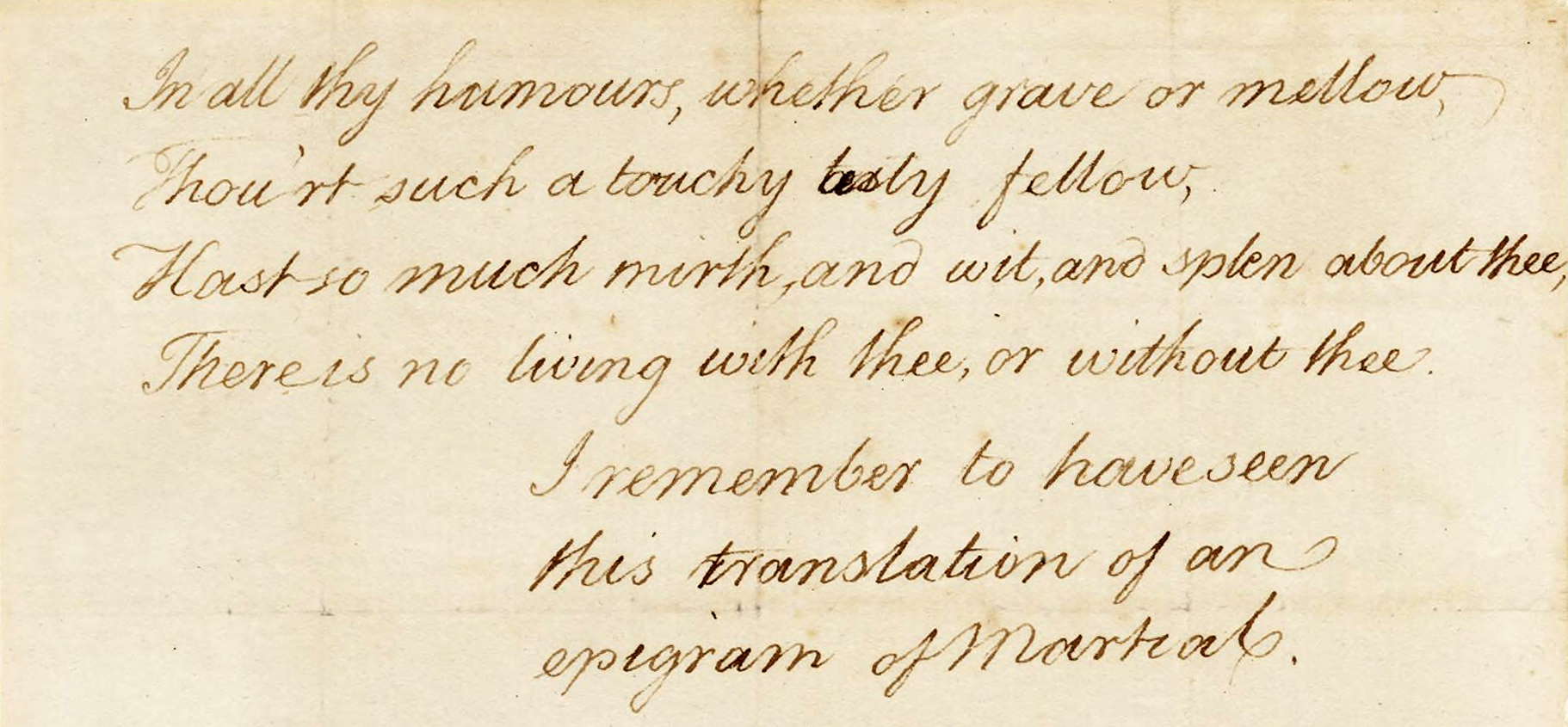 Page thirteen of Poems on Witty Subjects in Congress, from the Boston Public Library's American Revolutionary War Manuscripts Collection. |
"Those with Whom the Powers of Government Are Entrusted," by George Wythe
In this mix of prose and verse, Wythe seems to be trying to bring to light some complaint with Congress regarding a late ballot (perhaps with a remonstrance toward their agreement of secrecy), which he entreats the "college of censors" to inquire upon, despite one of the persons involved being as respected as Nestor of Greek mythology (but false as Milton's Belial):
|
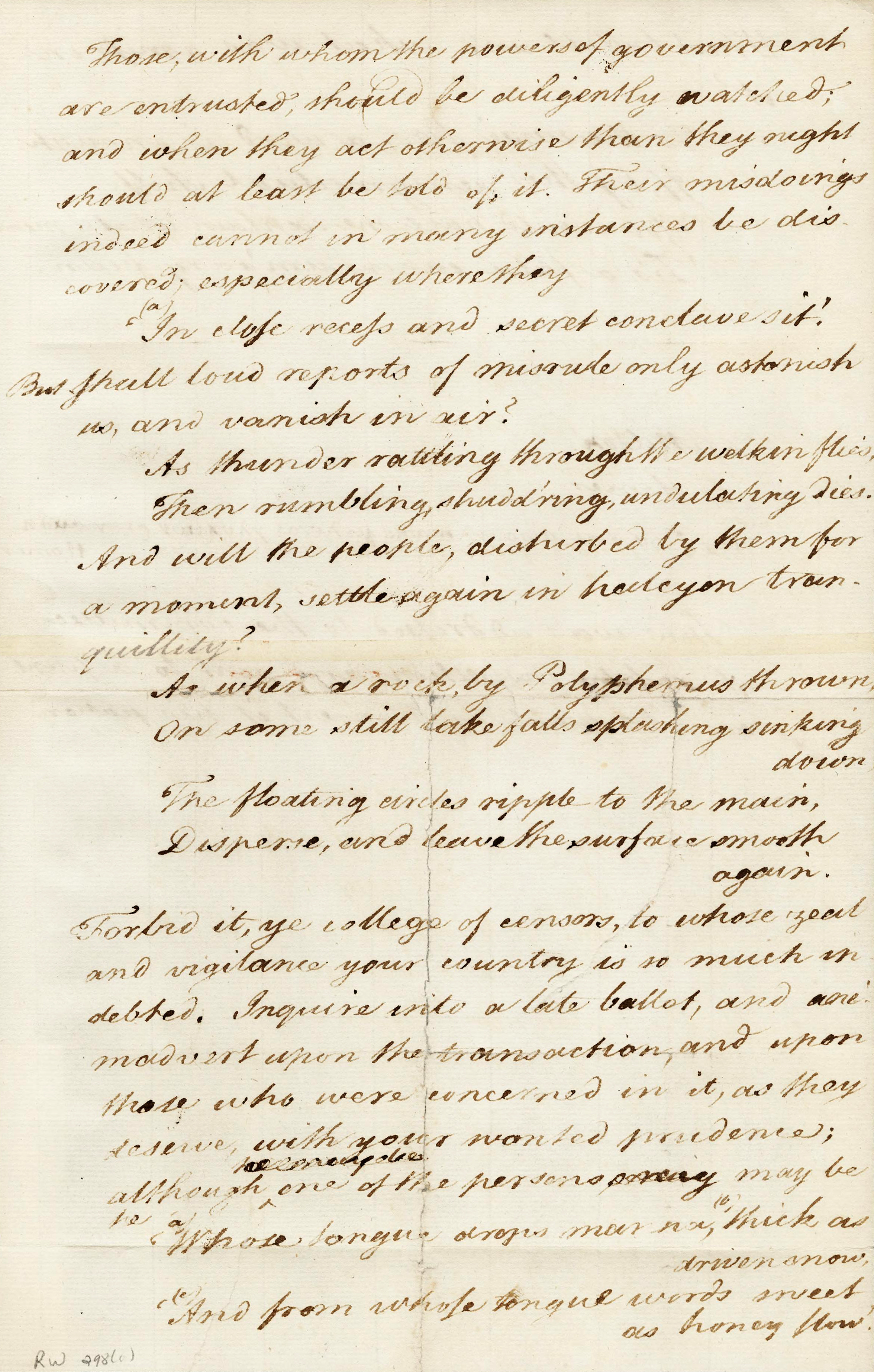 Page nineteen of Poems on Witty Subjects in Congress, from the Boston Public Library's American Revolutionary War Manuscripts Collection. | |
|
"A Commissioner, to the People of Philadelphia," by William Ellery
In this poem, Ellery chastises the conservative position of Andrew Allen, delegate from Pennsylvania, for his commonwealth's reluctance to support independence from Great Britain. The first letter of each line spells out "ANDREW ALLEN" (emphasized here). Ellery and Wythe apparently attempted to get the poem published, as there is another copy in Wythe's handwriting with the lines transposed to avoid obvious "libellus famosos" (libel), and a dramatized dialogue with a reluctant printer:
|
Copy of Ellery's "A Commissioner, to the People of Philadelphia," in Wythe's Hand, with dialogue
|
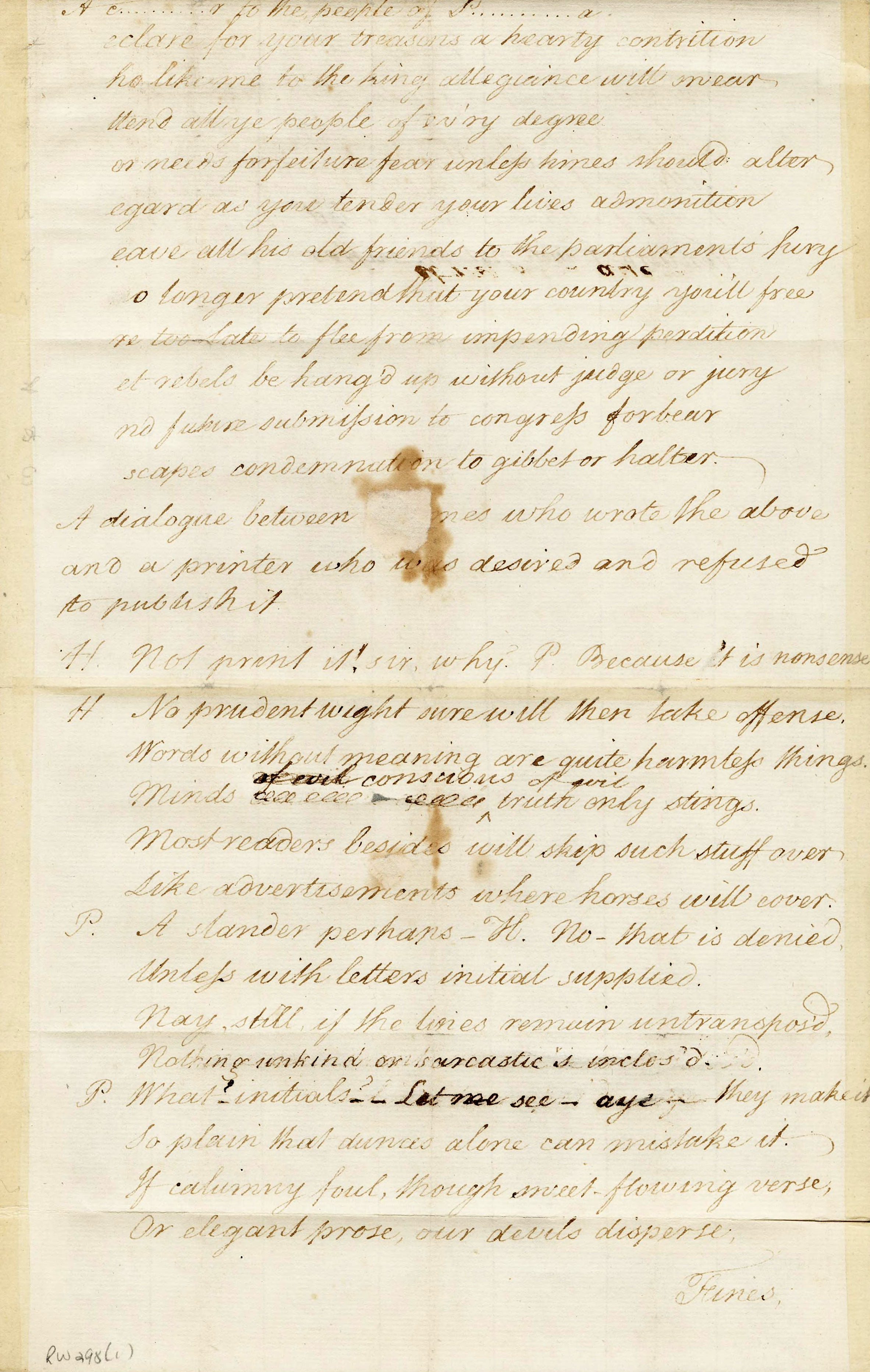 Page nineteen of Poems on Witty Subjects in Congress, from the Boston Public Library's American Revolutionary War Manuscripts Collection. | |
|
See also
Further reading
- Fowler, William M. William Ellery: A Rhode Island Politico and Lord of Admiralty. Metuchen, NJ: Scarecrow Press, 1973.
References
- ↑ The exact date of Wythe's arrival in Philadelphia is not known. Wythe's signature does not appear on a letter from the Virginia delegates to the Pennsylvania delegates dated September 12, 1776, regarding a temporary border between the two commonwealths (Peter Force, American Archives, 5th ser. (Washington, D.C.: M. St. Clair and Peter Force, 1851) 2:42; but Josiah Bartlett, in a letter to William Whipple dated September 14, reports "Mr. Wythe is come to Congress." Edmund C. Burnett, ed. Letters of Members of the Continental Congress, vol. 2, July 5, 1776 to December 31, 1777 (Washington, D.C.: Carnegie Institution of Washington, 1921), 89.
- ↑ W. Edwin Hemphill, "George Wythe Courts the Muses," William and Mary Quarterly 3rd ser., 9, no. 3 (July 1952), 340.
- ↑ "Novanglian": New Englander.
- ↑ "Dire desire to write," paraphrase of Virgil, Aeneid, Book V, line 721.
- ↑ "The love which consumed Dido," Queen of Carthage.
- ↑ General William Howe, (1729 – 1814), Commander-in-Chief of British forces during the American Revolutionary War, captured Philadelphia in September, 1777.
- ↑ Ovid, Ex Ponto III, xxxvi.
- ↑ Dubitatur: "It is doubted."
- ↑ Jester, clown.
- ↑ Defy nature, literally "go against Minerva's will." Cicero, De Officiis, I, 31, 110.
- ↑ Wythe is a Virginian Cicero: Marcus Tullius Cicero.
- ↑ A great law of Nature.
- ↑ Classical Greek cry of exultation or triumph, traditionally addressed to Apollo the healer.
- ↑ Bawbee: a Scottish half-penny.
- ↑ "As of late, you see."
- ↑ A translation matching Wythe's version of Marcus Valerius Martialis' epigram 12.47, written by Joseph Addison, appeared in The Spectator on May 18, 1711:
Difficilis, facilis, jucundus, acerbus es idem,
Nec tecum possum vivere, nec sine te.In all thy humours, whether grave or mellow,
Thou'rt such a touchy, testy, pleasant fellow;
Hast so much wit, and mirth, and spleen about thee.
There is no living with thee, nor without thee.An "odd volume" of The Spectator is listed in Thomas Jefferon's inventory of Wythe's library, among the books given to his son-in-law, Thomas Mann Randolph.
- ↑ Milton's demonic council in Paradise Lost, Book I, lines 792-797: "But far within, / And in their own dimensions, like themselves, / The great seraphic lords and cherubim/In close recess and secret conclave sat; / A thousand demigods on golden seats / Frequent and full."
- ↑ Milton, Paradise Lost, Book II, lines 112-113: "On the other side uprose / Belial, in act more graceful and humane. / A fairer person lost not Heaven; he seemed no / For dignity composed, and high exploit,/But all was false and hollow, though his tongue / Dropped manna, and could make the worse appear / The better reason, to perplex and dash / Maturest counsels...."
- ↑ Homer, Iliad, Book XII, lines 278-279: Stones are volleyed by the Trojans and Achaeans "as flakes of snow fall thick on a winter's day."
- ↑ Homer's admiration of Nestor, in the Iliad, Book I, line 249: "But Atreides / raged still on the other side, and between them Nestor / the fair-spoken rose up, the lucid speaker of Pylos, / from whose lips the streams of words ran sweeter than honey."
- ↑ Wythe translates this line of Homer as "And from whose tongue words sweet as honey flow."
- ↑ Libellus famosos: libel.
- ↑ A reference to the colonial punishment of cutting off ears?
- ↑ Edmund Curll (c. 1675 – 1747), whose name was synonymous with "unscrupulous publication and publicity."
External links
- Read these poems in the Internet Archive.
- Boston Public Library, Special Collections.
- American Revolutionary War Manuscripts at the Boston Public Library, Internet Archive.
